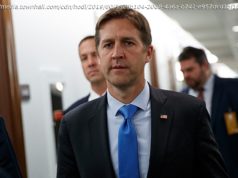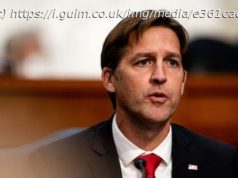Senator Susan Collins of Maine, a key Republican vote, said that “my fervent hope is that Brett Kavanaugh will work to lessen the divisions in the Supreme Court.”
Senator Susan Collins, Republican of Maine, announced her support on Friday for Judge Brett M. Kavanaugh’s Supreme Court nomination. With Ms. Collins’s key vote, Judge Kavanaugh is all but certain to be confirmed to the Supreme Court.
The announcement, delivered on the Senate floor, came after allegations of sexual misconduct against Judge Kavanaugh caused lawmakers and the White House to ask the F. B. I. to reopen an investigation into his background.
The following is a transcript of Ms. Collins’s remarks, as released by her office.
[ For more coverage of Judge Kavanaugh’s confirmation process, click here .]
______________
SENATOR SUSAN COLLINS: Mr. President, the five previous times that I have come to the floor to explain my vote on the nomination of a justice to the United States Supreme Court, I have begun my floor remarks explaining my decision with a recognition of the solemn nature and the importance of the occasion.
But today we have come to the conclusion of a confirmation process that has become so dysfunctional it looks more like a caricature of a gutter-level political campaign than a solemn occasion.
The President nominated Brett Kavanaugh on July 9th. Within moments of that announcement, special interest groups raced to be the first to oppose him, including one organization that didn’t even bother to fill in the Judge’s name on its pre-written press release – they simply wrote that they opposed “Donald Trump’s nomination of XX to the Supreme Court of the United States.” A number of Senators joined the race to announce their opposition, but they were beaten to the punch by one of our colleagues who actually announced opposition before the nominee’s identity was even known.
Since that time, we have seen special interest groups whip their followers into a frenzy by spreading misrepresentations and outright falsehoods about Judge Kavanaugh’s judicial record. Over-the-top rhetoric and distortions of his record and testimony at his first hearing produced short-lived headlines which, although debunked hours later, continue to live on and be spread through social media. Interest groups have also spent an unprecedented amount of dark money opposing this nomination.
Our Supreme Court confirmation process has been in steady decline for more than thirty years. One can only hope that the Kavanaugh nomination is where the process has finally hit rock bottom.
Against this backdrop, it is up to each individual Senator to decide what the Constitution’s “advice and consent” duty means. Informed by Alexander Hamilton’s Federalist 76, I have interpreted this to mean that the President has broad discretion to consider a nominee’s philosophy, whereas my duty as a Senator is to focus on the nominee’s qualifications as long as that nominee’s philosophy is within the mainstream of judicial thought.
I have always opposed litmus tests for judicial nominees with respect to their personal views or politics, but I fully expect them to be able to put aside any and all personal preferences in deciding the cases that come before them. I have never considered the President’s identity or party when evaluating Supreme Court nominations. As a result, I voted in favor of Justices Roberts and Alito, who were nominated by President Bush, Justices Sotomayor and Kagan, who were nominated by President Obama, and Justice Gorsuch, who was nominated by President Trump.
So I began my evaluation of Judge Kavanaugh’s nomination by reviewing his 12-year record on the DC Circuit Court of Appeals, including his more than 300 opinions and his many speeches and law review articles. Nineteen attorneys, including lawyers from the nonpartisan Congressional Research Service, briefed me many times each week and assisted me in evaluating the judge’s extensive record. I met with Judge Kavanaugh for more than two hours in my office. I listened carefully to the testimony at the Committee hearings. I spoke with people who knew him personally, such as Condoleezza Rice and many others. And, I talked with Judge Kavanaugh a second time by phone for another hour to ask him very specific additional questions.
I have also met with thousands of my constituents, both advocates and many opponents, regarding Judge Kavanaugh. One concern that I frequently heard was that Judge Kavanaugh would be likely to eliminate the Affordable Care Act’s (ACA) vital protections for people with pre-existing conditions. I disagree with this contention. In a dissent in Seven-Sky v. Holder, Judge Kavanaugh rejected a challenge to the ACA on narrow procedural grounds, preserving the law in full. Many experts have said his dissent informed Justice Roberts’ opinion upholding the ACA at the Supreme Court.
Furthermore, Judge Kavanaugh’s approach toward the doctrine of severability is narrow. When a part of a statute is challenged on constitutional grounds, he has argued for severing the invalid clause as surgically as possible while allowing the overall law to remain intact.
This was his approach in his dissent in a case that involved a challenge to the structure of the Consumer Financial Protection Bureau ( PPH v. CFPB). In his dissent, Judge Kavanaugh argued for “severing any problematic portions while leaving the remainder intact.” Given the current challenges to the ACA, proponents, including myself, of protections for people with pre-existing conditions should want a Justice who would take just this kind of approach.
Another assertion I have heard often is that Judge Kavanaugh cannot be trusted if a case involving alleged wrongdoing by the President were to come before the Court. The basis for this argument seems to be twofold. First, Judge Kavanaugh has written that he believes that Congress should enact legislation to protect presidents from criminal prosecution or civil liability while in office. Mr. President, I believe opponents miss the mark on this issue. The fact that Judge Kavanaugh offered this legislative proposal suggests that he believes that the President does not have such protection currently.
Second, there are some who argue that given the current Special Counsel investigation, President Trump should not even be allowed to nominate a justice. That argument ignores our recent history. President Clinton, in 1993, nominated Justice Ginsburg after the Whitewater investigation was already underway. And she was confirmed 96-3. The next year, just three months after Independent Counsel Robert Fiske was named to lead the Whitewater investigation, President Clinton nominated Justice Breyer. He was confirmed 87-9.
Supreme Court Justices have not hesitated to rule against the presidents who have nominated them. Perhaps most notably in United States v. Nixon, three Nixon appointees who heard the case joined the unanimous opinion against him.
Judge Kavanaugh has been unequivocal in his belief that no president is above the law. He has stated that Marbury v. Madison, Youngstown Steel v. Sawyer and United States v. Nixon are three of the four greatest Supreme Court cases in history. What do they have in common? Each of them is a case where the Court served as a check on presidential power. And I would note that the fourth case that Judge Kavanaugh has pointed to as the greatest in history was Brown v Board of Education.
One Kavanaugh decision illustrates the point about the check on presidential power directly. He wrote the opinion in Hamdan v. United States, a case that challenged the Bush Administration’s military commission prosecution of an associate of Osama Bin Laden. This conviction was very important to the Bush Administration, but Judge Kavanaugh, who had been appointed to the DC Circuit by President Bush and had worked in President Bush’s White House, ruled that the conviction was unlawful. As he explained during the hearing, “We don’t make decisions based on who people are, or their policy preferences, or the moment. We base decisions on the law….”
Others I met with have expressed concerns that Justice Kennedy’s retirement threatens the right of same sex couples to marry. Yet, Judge Kavanaugh described the Obergefell decision, which legalized same gender marriages, as an important landmark precedent. He also cited Justice Kennedy’s recent Masterpiece Cakeshop opinion for the Court’s majority stating that: “The days of treating gay and lesbian Americans or gay and lesbian couples as second-class citizens who are inferior in dignity and worth are over in the Supreme Court.”
Others have suggested that the judge holds extreme views on birth control. In one case, Judge Kavanaugh incurred the disfavor of both sides of the political spectrum for seeking to ensure the availability of contraceptive services for women while minimizing the involvement of employers with religious objections. Although his critics frequently overlook this point, Judge Kavanaugh’s dissent rejected arguments that the government did not have a compelling interest in facilitating access to contraception. In fact, he wrote that the Supreme Court precedent “strongly suggested” that there was a “compelling interest” in facilitating access to birth control.
There has also been considerable focus on the future of abortion rights based on the concern that Judge Kavanaugh would seek to overturn Roe v. Wade. Protecting this right is important to me.
To my knowledge, Judge Kavanaugh is the first Supreme Court nominee to express the view that precedent is not merely a practice and tradition, but rooted in Article III of our Constitution itself. He believes that precedent “is not just a judicial policy … it is constitutionally dictated to pay attention and pay heed to rules of precedent.” In other words, precedent isn’t a goal or an aspiration; it is a constitutional tenet that has to be followed except in the most extraordinary circumstances.
The judge further explained that precedent provides stability, predictability, reliance, and fairness. There are, of course, rare and extraordinary times where the Supreme Court would rightly overturn a precedent. The most famous example was when the Supreme Court in Brown v. Board of Education overruled Plessy v. Ferguson, correcting a “grievously wrong” decision—to use the judge’s term—allowing racial inequality. But, someone who believes that the importance of precedent has been rooted in the Constitution would follow long-established precedent except in those rare circumstances where a decision is “grievously wrong” or “deeply inconsistent with the law.” Those are Judge Kavanaugh’s phrases.
As Judge Kavanaugh asserted to me, a long-established precedent is not something to be trimmed, narrowed, discarded, or overlooked. Its roots in the Constitution give the concept of stare decisis greater weight such that precedent can’t be trimmed or narrowed simply because a judge might want to on a whim. In short, his views on honoring precedent would preclude attempts to do by stealth that which one has committed not to do overtly.
Noting that Roe v. Wade was decided 45 years ago, and reaffirmed 19 years later in Planned Parenthood v. Casey, I asked Judge Kavanaugh whether the passage of time is relevant to following precedent. He said decisions become part of our legal framework with the passage of time and that honoring precedent is essential to maintaining public confidence.
Our discussion then turned to the right of privacy, on which the Supreme Court relied in Griswold v. Connecticut, a case that struck down a law banning the use and sale of contraceptives. Griswold established the legal foundation that led to Roe eight years later. In describing Griswold as “settled law,” Judge Kavanaugh observed that it was the correct application of two famous cases from the 1920s, Meyer and Pierce, that are not seriously challenged by anyone today. Finally, in his testimony, he noted repeatedly that Roe had been upheld by Planned Parenthood v. Casey, describing it as “precedent on precedent.” When I asked him would it be sufficient to overturn a long-established precedent if five current justices believed it was wrongly decided, he emphatically said “no.”
Opponents frequently cite then-candidate Donald Trump’s campaign pledge to nominate only judges who would overturn Roe. The Republican platform for all presidential campaigns has included this pledge since at least 1980. During this time, Republican presidents have appointed Justices O’Connor, Souter, and Kennedy to the Supreme Court. These are the very three justices—Republican president appointed justices—who authored the Casey decision, which reaffirmed Roe. Furthermore, pro-choice groups vigorously opposed each of these justices’ nominations. Incredibly, they even circulated buttons with the slogan “Stop Souter Or Women Will Die!” Just two years later, Justice Souter co-authored the Casey opinion, reaffirming a woman’s right to choose.
Home
United States
USA — Political Read Susan Collins’s Speech Declaring Support for Brett Kavanaugh






